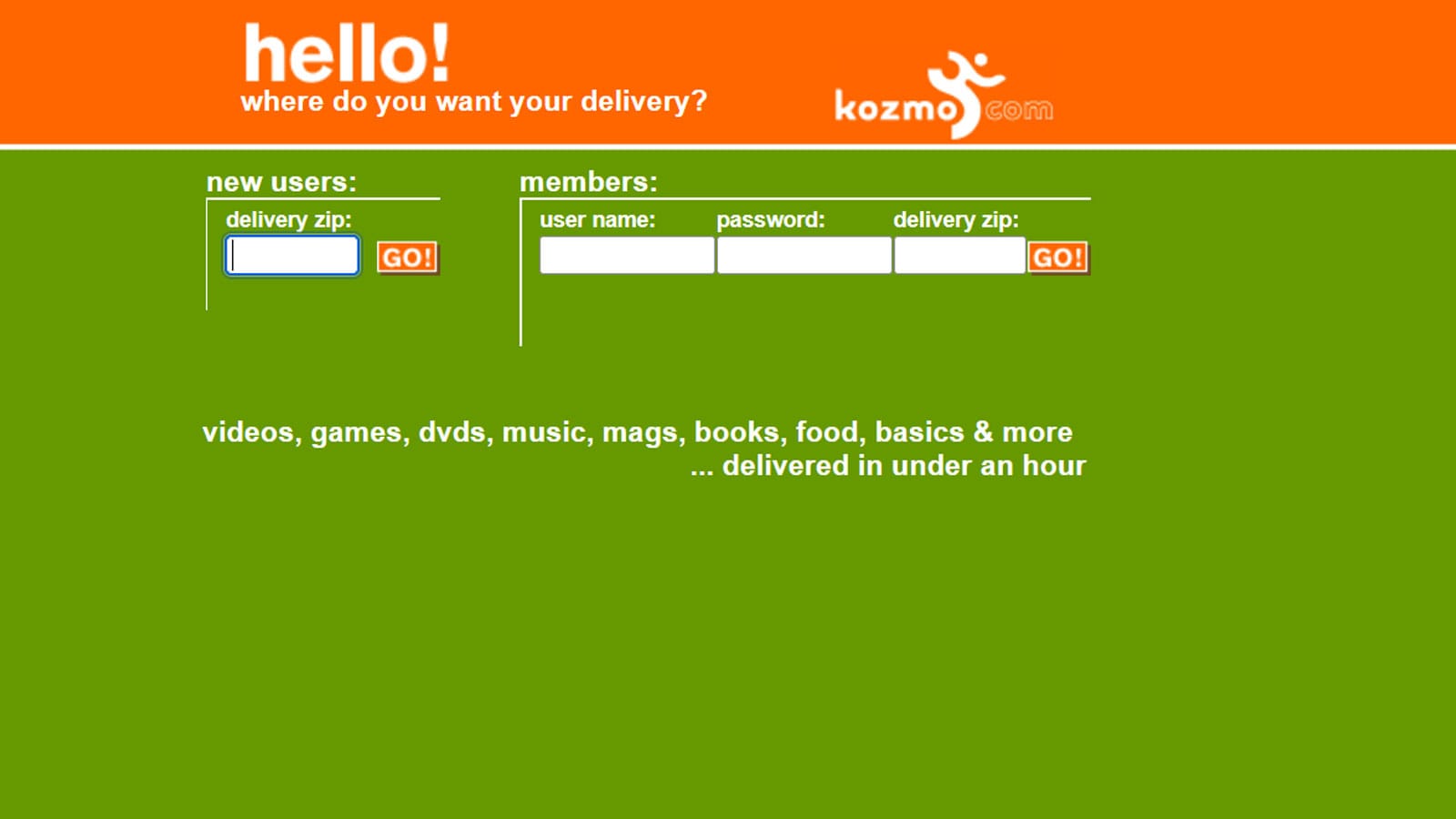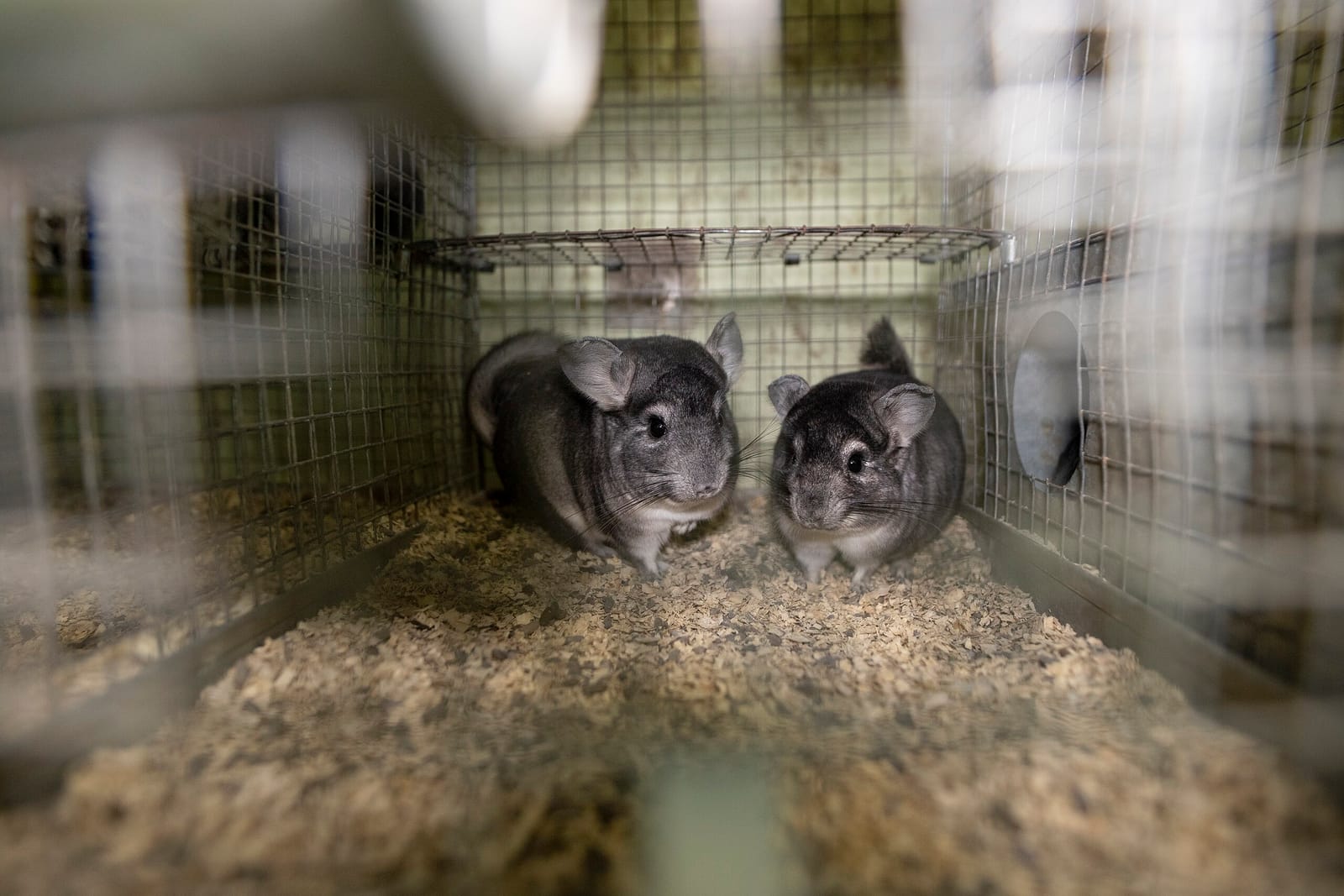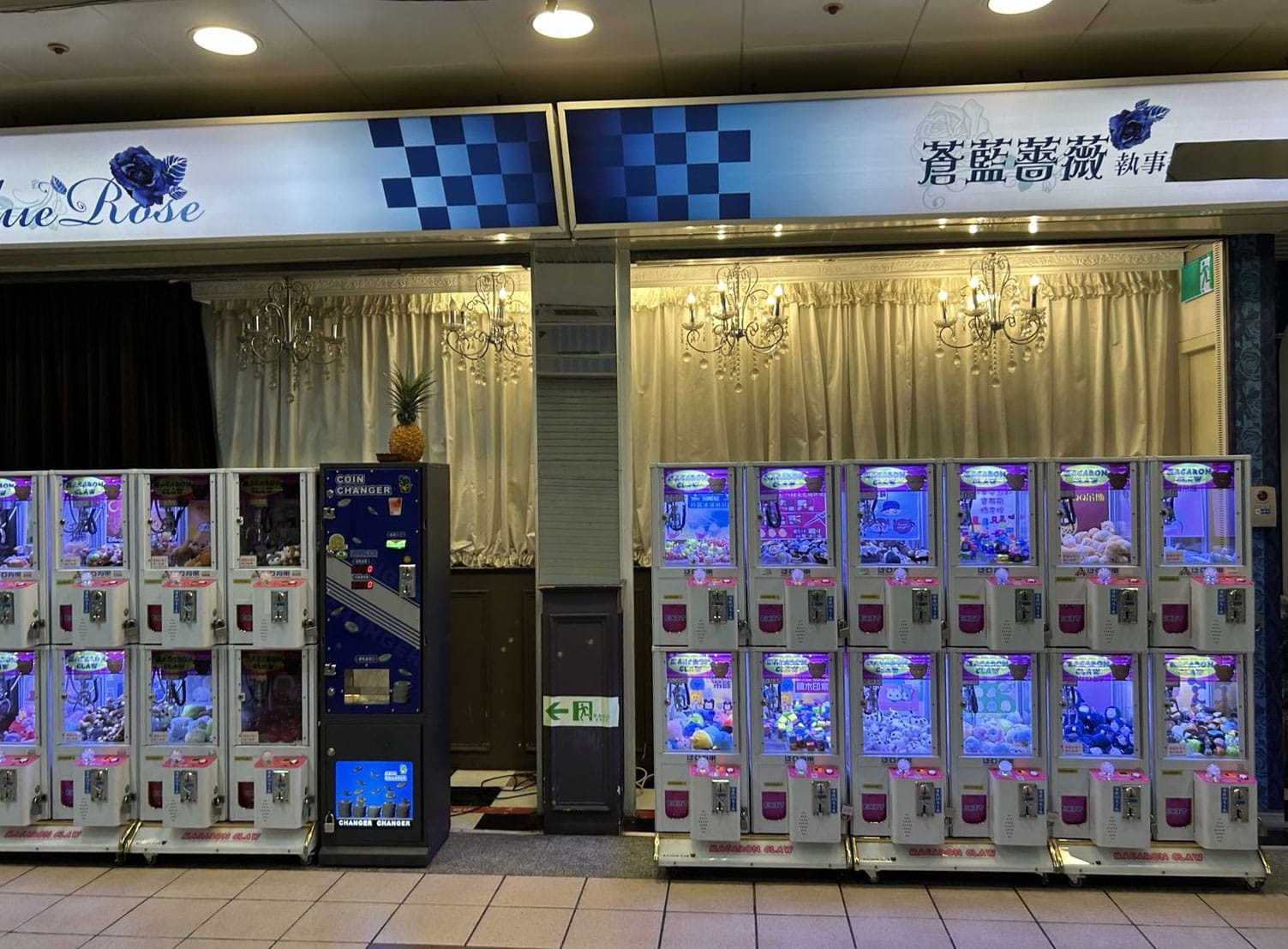 2001 Wayback Machine capture of kozmo.com home page
Today: A.J. Daulerio, editor, journalist and the proprietor of The Small Bow; and Brian Hioe, Taipei-based editor, translator, activist, DJ, and co-founder of New Bloom.
Issue No. 151Kozmo-politan
A.J. Daulerio The Chinchilla Expert
Brian Hioe
Kozmo-politanby A.J. DaulerioThis story is part of The Lost Internet, a month-long series in which the members of Flaming Hydra revisit internet marvels of the past.
When I first moved to Manhattan in December 1999, I was making $23,500 as a reporter for a legal news wire service. I was also dating someone who had rich-person tastes in wine and restaurants, was unafraid to accumulate credit card debt, and was more sophisticated than anyone I’d ever dated—she had an apartment in the East Village with black-and-white photographs and posters that had French words on them. She also exposed me to high-speed internet (she had a primo DSL line), which transformed me from a casual internet user burdened by the snail’s pace of a lugubrious dial-up connection into a terminally online one. I spent the majority of my time online between a janky roulette room where you could win (or lose, mostly lose) actual money and the Zoetrope All-Story message board, the literary wing of Francis Ford Coppola’s production company, where I posted sloppy short fiction in the hopes of grabbing the attention of someone important enough to rescue me from obscurity and the legal news doldrums. (“Francis, you should check out this story about a lonely old man who weightlifts in the nude that was posted last night—the kid’s got talent!”) One of my first realizations that Manhattan was not like any other place on Earth I’d lived before (meaning, up until that moment, my parent’s home in the suburbs of Philadelphia) was the exotic food delivery options, many of which were available long into the night, sometimes 24 hours a day. Also readily available for delivery—drugs! Although I was struggling to make my share of the rent on my low salary, it appeared the rest of the city’s up-and-coming 20-somethings were having the time of their lives, accumulating massive wealth and/or fame during the first Dot Com boom. Every week, I’d read a capsule story in the New York Observer about founders wearing sneakers in their opulent offices full of foosball tables and bottomless snack baskets. Eventually it would emerge that many of these companies were run by real charlatans torching then-incomprehensible sums, like Pets.com ($147 million), Webvan ($375 million) DEN ($88 million), and Boo.com ($188 million), all of them chasing madly after market share that would never exist. I was both contemptuous of the scene and insanely jealous, especially of anyone who worked at Salon.com cynically covering any of these fly-by-night companies. (I initially thought Salon would qualify as part of the “lost internet,” but I was shocked to discover it still publishes regularly, although it is a more charmless version of the one I remember.) The seemingly unlimited license of the tech highfliers met the seemingly unlimited possibilities of New York City's delivery culture in Kozmo.com, which offered to bring users much, much more than restaurant food—you could spend money on marked-up groceries, toiletries, cigarettes, booze, Starbucks coffee, and, what was most exciting to me, “DVDs and video games.” I became a very active consumer of everything Kozmo had to offer, especially after I’d purchased a ridiculously overpriced PS2 off of eBay. I can still remember some of the items I ordered there: Marlboro Lights, Skor bars, Tropical Starburst, Talk magazine, NHL 2001, The Hurricane on DVD—hundreds of dollars on items I could easily have purchased either at a bodega or Tower Records, but the door-to-door service made it feel like I was part of something cosmopolitan and futuristic, an active participant in the cultural and tech renaissance the Observer was writing about. But unable to sustain its high delivery costs and the extravagant, obnoxious spending habits of its founders, Kozmo busted out in the crash. No more late-night DVD deliveries, no more video games. My life suddenly became gloomier, along with everyone else’s who’d been energized and inspired by the dream-chasing of the first dot-com era. I remember reading the “Elegy for Kozmo” (published on Salon.com, obv.) written with a sarcastic Shakespearean flair by a writer named Damien Cave: Yet Internet analysts, hype-mongers turned crash-addicts, say Kozmo was ambitious;
And, sure, the talking heads and market makers are always right.
I speak not to disapprove of what they, the venture capitalists and Wall Street, spoke
But here I am to speak what I do know
We all did love Kozmo once, not without cause:
What cause withholds us then to mourn for it?
O judgment! Thou art fled to brutish beasts,
And couch potatoes have lost their best friend. Bear with me;
My heart and stomach are in the bankruptcy filing there with Kozmo,
And I must pause till they come back to me.
A few weeks later, drowning in my credit card debt, I’d sell my PS2 on Craig’s List for about 80% less than I’d bought it for.
LIBRARIES UNDER SIEGEThe Internet Archive has lost its appeal in the case of Hachette v. Internet Archive. The matter won’t end here but this decision is a potential blow to the future of libraries, which can now be forced by big publishers to pay for ebook licenses over and over instead of buying one copy and lending it out indefinitely. Independent publishers and writers are free to protect traditional library rights by making sure that libraries can own our ebooks permanently, and that is exactly what we are going to do (and soon!) at Flaming Hydra.
The Chinchilla Expert Otwarte Klatki [CC BY 2.0] via Wikimedia Commons There’s a raccoon in the Taipei Zoo who’d previously been the mascot of a cafe, but was neglected and then abandoned by its owner. One also sees exotic dogs in the streets here, obviously former pets who’ve just been cast out. Living creatures can be treated like toys, it seems. The other day, I discovered that a store near me in Bangka sells chinchillas. Of course, I had to go. I never pass up an opportunity to see a cute animal, even if I harbor certain doubts about whether such animals should be kept in captivity. To my surprise, it wasn’t the kind of pet store where you could browse and look at different animals on your own. I had imagined there would be a few chinchillas, alongside a number of other potential pets. But no, it turned out that they specialized exclusively in chinchillas. What followed was an intense 30-minute conversation with the store owner, a man who was clearly in his early 20s but somehow owned a store full of chinchillas. He seemed to assume that I had researched chinchillas ahead of time before venturing into his shop, rather than having randomly seen an ad on Instagram and wandering over because I live nearby, as was the case. I wound up pretending I knew much more about chinchillas, their varieties, habits, and care than I did. It felt as though it would have been excruciatingly awkward if I admitted to knowing nothing about chinchillas and having walked in despite that, so I tried to act otherwise. This man evidently had a genuine, deep, abiding passion for chinchillas. Why else would he plunk hundreds of thousands of NT on a store full of chinchillas, who need to be in a constantly air-conditioned environment, apparently? To be sure, he struck me as probably some rich kid, but even so, it would take quite a lot of drive and focus to open a brick-and-mortar store devoted to chinchillas, and to sit there, surrounded by chinchillas, day in and day out. I think that to a degree I envy people with strong, guiding obsessions—probably because I have a slight fear that I may be a rather passionless individual. In addition to the chinchilla shop, there are several other extremely random establishments in my neighborhood, Bangka. There’s a store devoted exclusively to kitty litter, featuring stacks of large bags of kitty litter. Perhaps the owner has a passion for kitty litter? Or has discovered a massively profitable angle on kitty litter? Who am I to judge? I’ve long wondered about what it must be like, say, to open a store that sells just one kind of screw or broom or camera, and that being your life. How does it feel to have devoted your life to that? For me, as a writer, I always hoped to leave something worthwhile behind, but surely that could be a respectable life, a life with meaning and dignity as well—to devote one’s life to chinchillas or kitty litter.  Image courtesy of the author There’s an underground street full of otakus around Taipei Main Station. On the weekend, the area fills up with people in cosplay, wandering through the gaming arcades and the stores selling action figures, Gundam models, and capsule toys. I’ve gone there many times with otaku friends. While they nerd out at action figures, or toys, I tend to look on detachedly. I’m always astonished at how they can spend so many hours browsing excitedly through the different toy stores, crane claw machine shops, or Gatcha machines. For me, it all just starts to look the same after a while. Still, I like walking through there on weekends just for the vibes, because of the obvious enthusiasm of the people around me. A part of me really envies them. I also have nerd interests, after all, but I’m not so passionate about it that buying a figurine can make me happy or entertain me for long. I’ve noticed how the store owners seem to share my apathy; they mostly seem like older people who’ve just jumped on board with these trends to make a living, rather than fans—though you do encounter the occasional fan-run store. I guess I haven’t got much desire to exploit in today’s capitalist hellscape; most of my money goes to food or drink. I would rather have an interesting experience than a Gundam model that sits on my shelf, taking up space and collecting dust. Even so... Chinchillas live for fifteen years, as it turns out! I’m just not sure how much you can interact with them or what kinds of personalities they have. And I wouldn’t want to find myself in the position of the Taipei Zoo raccoon’s former owner, unable to care for this potential pet. So far, I don’t feel as though I could be responsible for the weight of a life. Still, I do think I might have a more enjoyable home life if I owned a chinchilla. For better or worse, these are the mechanisms of desire that make the gears of this society continue to spin.
HYDRAS LOVE POETRY, COMBUSTIBLESHang with Hydra Clive Thompson on Daniel Bashir's The Gradient podcast, talking technology, Proust, and poetry.
If you love this newsletter and the principles of press freedom and independence it supports, subscribe, donate, and RRRAaarrrwwrrrr.
|